Sixth Street CEO: AI Transition Risk and Investment Evolution
- Jul 24, 2025
- 3 min read
In Brief:
Alan Waxman warns that the financial system faces significant overlooked risks from AI's productivity transition, citing insufficient discussion about job displacement and economic rebalancing as artificial intelligence reshapes entire industries. The CEO of Sixth Street, one of the world's most flexible investment firms managing over $75 billion across all asset classes, shared insights during his appearance on the Invest Like The Best podcast from his journey building a "go-anywhere" investment platform that can write billion-dollar checks across sectors, geographies, and capital structures. Speaking from his firm's unique position as both debt and equity investors in companies ranging from Spotify to Real Madrid, Waxman detailed how his Goldman Sachs Special Situations Group experience shaped an investment philosophy centered on "unitizing risk and return" - comparing opportunities across all asset classes rather than operating in traditional silos.
Big Picture Drivers:
AI Transition Risk: Productivity gains from artificial intelligence will create massive job displacement without adequate planning for economic rebalancing
Wealth Channel Shift: High net worth investors are dramatically underexposed to private alternatives at 3-5% versus pension funds at 40-50%
Private Market Growth: 93% of companies with $100M+ revenue now remain private, fundamentally changing capital allocation dynamics
Experience Economy: COVID revealed humans value experiences over material goods, driving investment themes in sports and live entertainment
Key Topics Covered:
Goldman Sachs Foundation: How the Special Situations Group's $25 billion balance sheet and "can't lose money" mandate shaped modern investment philosophy
Sixth Street Architecture: Building 10 investment platforms under one umbrella with the TAO fund providing flexible capital for billion-dollar deals
Notable Investments: Detailed case studies of Spotify's $1 billion convertible financing and Airbnb's COVID-era billion-dollar rescue
Culture Framework: The "over yourself" principle borrowed from San Antonio Spurs and "facing the tiger" mentality for handling crises
Key Insights:
Risk Unitization: The most successful investors compare risk-adjusted returns across all asset classes rather than operating within single-strategy silos, allowing migration to wherever the best opportunities exist at any given time.
Theme Shelf Life: Investment themes typically remain profitable for 12-36 months before smart money floods in and returns deteriorate, requiring constant evolution and 15-25 active themes simultaneously.
Crisis Preparation: Firms that protect capital during market euphoria (2006-2007 behavior) position themselves to play offense during downturns, as demonstrated during both the 2008 financial crisis and COVID-19.
Whiteboard Solutions: The highest-value investments emerge from collaborative problem-solving sessions with CEOs rather than presenting predetermined structures, requiring entrepreneurial flexibility over rigid product offerings.
Cultural Scalability: Maintaining startup culture while managing $75+ billion requires obsessive focus on hiring people "over themselves" and systematic development through personal business plans aligned with five-year strategic planning.
Future Workforce: Personal development should focus on building the largest possible toolkit early in careers to maximize "return on time" and enable greater work-life integration later.
Memorable Quotes:
"Human beings natural reaction when there's a problem and you can see this in so many facets of life. The first thing is to run" - Alan Waxman, explaining why most people avoid crises while Sixth Street embraces them as opportunities
"At Six Street, we're like, 'Good, let's go. Let's face the tiger together'" - Alan Waxman, describing the firm's crisis response culture when investments go wrong
"We have to be a firm of entrepreneurs. We're one of the few handful of firms in the world that can consistently write billion dollar plus checks across asset classes" - Alan Waxman, explaining how Sixth Street's entrepreneurial culture enables unprecedented scale and flexibility
"Just because you can raise capital doesn't mean you should" - Alan Waxman, sharing advice from mentor Jamie Gates about responsible capital raising in the wealth channel
"We want people that are over themselves because if you think about a multistrategy investing business, the enemy of a multi strategy investing businesses is fiefdoms and silos" - Alan Waxman, explaining why ego undermines cross-platform collaboration
The Wrap:
Waxman's interview reveals how the most successful modern investment firms operate more like technology platforms than traditional asset managers, requiring cultural evolution alongside financial innovation. His warnings about AI transition risks and observations about private market growth suggest fundamental shifts in how capital flows through the economy, while his firm's track record demonstrates that flexibility and collaboration increasingly matter more than specialized expertise in generating superior returns.



Comments